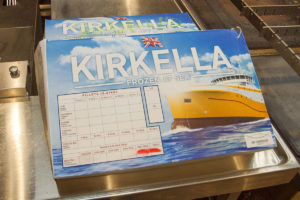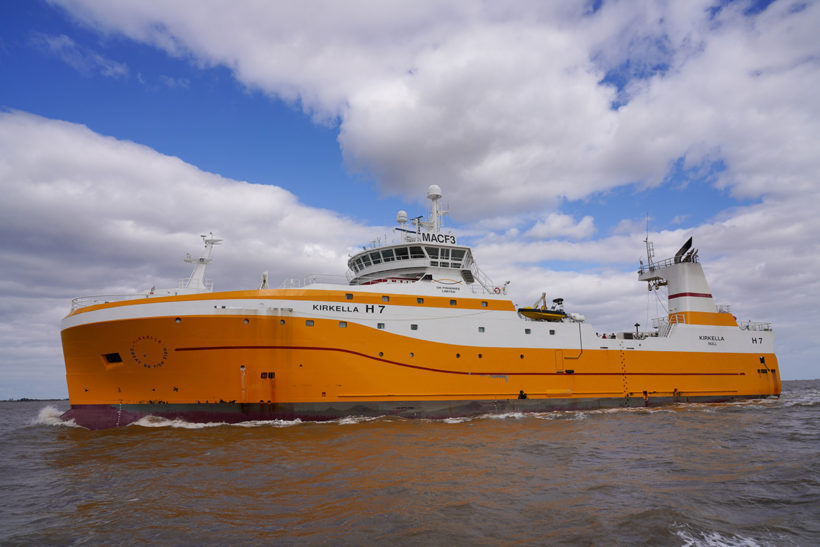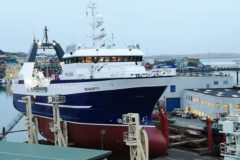The figures are now well-known across the industry, but three months ago, very few people realised how dependent the UK – the catering trade in particular – is on Russian fish, reports Andy Read.
Knee-jerk announcements by politicians make great headlines. It is unlikely, however, that the chancellor realised the full implications of his announcement about the imposition of tariffs on Russian fish for the catering sector. This tariff is, in reality, almost impossible to impose on fish that is regularly reprocessed and relabelled. In the case of Faroese whitefish entering the UK, it is caught by Faroese vessels in exchange for permission for Russian vessels to fish in the shared UK/Faroe zone for pelagic fish.
Without alternatives, a successful imposition of tariffs would, as one writer here shows, have a huge and negative impact on the fish and chip shop trade. Alternatives are there, but a sector struggling with record price increases and customers facing a financial squeeze will need time and support to adjust.
A more effective – and as articles in this feature explain, financially attractive – way forward for the UK may be to find a way to replace the huge volume of imported whitefish with alternative products, caught and processed in the UK.
Fishing News is grateful to the writers here, who we hope are starting a wider debate across the entire fisheries value chain about ways in which the UK can adapt to the new reality, and address our dependence on imported fish…
Support the UK to catch what it needs!
Jane Sandell, CEO of UK Fisheries, operator of the last of the distant-water vessels working from Humberside, makes an impassioned plea for politicians to restore the fishing opportunities that would enable the UK to become self-sufficient in whitefish
Vladimir Putin’s criminal assault on Ukraine has laid down a challenge to many of the certainties of the post-Cold War period. In violating the borders of a sovereign European democratic state, the Russian president also left the continent’s energy and food security strategy in tatters, and governments from London to Madrid and beyond have been left scrabbling for answers.
For the UK, a simple and worrying truth has been laid bare: the United Kingdom is far too dependent on food imports. While we do not possess the agricultural land or the marine resources to feed ourselves entirely, we can and must do more to reduce our dependence on rogue states such as Russia at a time of international crisis.
There is a strong ethical dimension to this challenge alongside the obvious basic duty of any government to ensure its citizens have access to sufficient, high-quality food. Each year, the UK imports about £200m-worth of frozen whitefish fillets, or about 20,000t, from Russia. This reliance is now completely indefensible as it puts hard cash directly into the pockets of the Russian oligarchs, even as we are looking to impose tight sanctions in other areas.
The UK’s distant-waters fleet, whose fortunes have been wantonly neglected by our government in post-Brexit fishing deals with partner states such as Norway, can and should be part of the solution. Not only would a revitalised fleet reduce our reliance on imports, it would also help preserve an important industry and guarantee vital jobs in the North East of England.

UK Fisheries specialises in frozen-at-sea fillets that are sold direct to the fish and chip shop trade.
Over recent years the ability of the UK distant-waters fleet to fish its traditional waters in and around the Barents Sea has been seriously compromised by serial government failures in quota negotiations. While we were able to catch 15,000t of Arctic cod or more each year in the Norwegian zone towards the end of the last decade, we now have a 2022 quota of just 6,500t of cod in the waters around Svalbard, and barely anything anywhere else.
It doesn’t have to be this way. The Norwegians share a huge bounty of 800,000t of cod quotas with Russia, with just 550t allocated to British boats – despite the huge dependence of the Norwegian economy on exports of fisheries produces to Britain. There is now a moral as well as an ethical imperative for the government to leverage this relationship to the advantage of our own domestic fishing industry.
Until recently, UK Fisheries’ state-of-the-art trawler Kirkella supplied around one in 12 portions of whitefish sold in the nation’s chippies. But as a nation we are now more reliant than ever on imports of cod and haddock from Iceland, Norway and crucially Russia to feed our takeaways.
And yet there is little sign that our government is prepared to take action to remedy this, or to do the right thing on sanctions. A recent government decision to slap a 35% tariff on Russian whitefish imports was quietly shelved when the reality sank in about the effect this might have on the price of fish. The obvious solution – help our domestic fleet increase its own production – does not yet seem to have reached the right desks in Whitehall and Westminster.
How can this be? The arithmetic is not too difficult. Double or treble the UK’s quota in negotiations with Norway and you immediately make the supply chain less reliant on Russian fish, with knock-on effects for jobs and, of course, the UK’s food security.
Fish and chips, never rationed even in the darkest days of the Second World War, are now almost becoming a luxury as chippies up and down the country find themselves priced out of the market. And yet we find ourselves on the cusp of having to import a dramatically increasing proportion of the fish for our national dish.
In short: if Norway wants continued favourable terms for its exports to us, it should allow British fishers to carry on working their traditional grounds off the Norwegian coast and supply our market with more British-caught cod and haddock.
Foreign secretary Liz Truss once famously declared it a disgrace that the UK imported cheese. Well, we can’t make our own authentic Camembert or Parmesan, but for the UK fishing industry a solution is close at hand. We can and must reduce our reliance on Russian fish.
Instead of filling Putin’s war chest, we should be reasserting our rights to fish in our historic distant fishing grounds, giving British fishers the ability to help secure our own national food supplies and preserving this vitally important part of our economic and cultural seascape.
This story was taken from the latest issue of Fishing News. For more up-to-date and in-depth reports on the UK and Irish commercial fishing sector, subscribe to Fishing News here or buy the latest single issue for just £3.30 here.
Read another article from our ‘Ways To Wean The UK Off Its Russian Fish Habit’ here.






